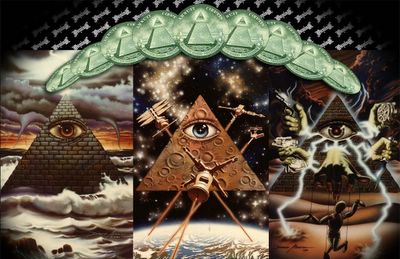
5. After anyone proceeds in practice long enough, even koans that a student is not formally studying begin to take on meaning that wasn't apparent previously. What koans do you find particularly inscrutable?
Well, first of all, I'm a Soto Zen student, not Rinzai, and in Soto, we don't have a formal koan practice. To be sure, we use koans as dharma study, and discuss them, but we don't have a formal system of working on each one and becoming one with the koan before passing on to the next as in Rinzai study, and the focus of Soto study is on gradual enlightenment through shinantaza ("just sitting") rather than a sudden kensho experience. We feel that life presents enough riddles in and of itself, there's no need to challenge ourselves with any more.
This is not to say that one way is correct and the other isn't. It's just that it's been my karma to have met a Soto teacher, and I study under his direction in the Soto tradition. I appreciate and am fascinated by much in Rinzai, especially the koan practice, but feel it is better to work under one teacher than to smorgasbord around willy-nilly for what interests me here, what satisfies my ego there. So it is not a criticism of Rinzai that I do not do formal koan practice, but just an acknowledgement that my practice is shikantaza.
Many koans, on first hearing, sound inscruitable - almost like absurdist theater: "Shokai met a teacher on the road. He put his sandals on the back of a turtle, and the teacher hit him with a stick. At that moment, Shokai was enlightened." What amazes me is that with practice and teaching, many koans become clearer with time, despite the bizarre behavior and speech documented.
The upside of this is that although I may never work my way through a particular koan, I'll never get stuck on one either.

3 comments:
This is interesting. There is so much to learn. It is good there is time to learn.
As one of those who has not studied or practiced Zen Buddhism, I always found the koans particularly opaque as teaching tools. But reading some of your posts, Shokai, I wonder if a little insight actaully got into my head. For instance, "when you meet the Buddha you kill the Buddha" oridinally struck me as whacky but then it occured to me that all this might be is a warning: if you think the Buddha is the person across the table from you, how much of the Buddha is left in you? That is, the Buddha you can meet/exeternalize can't be the real buddha. Or perhaps even more simply "having gurus is a dangerous distinction to hold in your mind". I looked it up then at http://www.impermanent.net/bowz/teishos/blacker-noteisho.html
and, well, I think I am getting warm.
This is a really cool response; as somebody who did a bit of training at a Sambokyodan Zendo(Three Treasures- Maezumi-Rohsi's lineage via John Daido Loori), I do sense a difference of style here between your Soto lineage and theirs (which is admittedly a blend of Soto/Rinzai).
To riff a bit on Daido-roshi,
as well as Eido Shimano-roshi pretty much all koans are expressions of MU.
So as one progesses in MU (or shikan taza) one is also progressing on these other koans as well and vice-versa.
Both Maezumi-roshi and Eido Shimano-roshi have pointed out that there is only a difference of emphasis between shikantaza and MU.
BTW, I heartily agree it's much better to work under a single teacher- but- it's useful if you are a rank beginner and don't have a scintilla of an awareness of enlightenment (or if you've recently had to move far away from your previous sangha and are a novice) to "kick the tires" of prospective teachers.
The relationship with a teacher is a deeply intimate one, which is kind of odd as you actually spend a great deal of time together in utter silence or in chanting translitterated Pali or Chinese. So if anyone reading this is not a serious Zen student without a teacher and wants to be a more serious Zen student, it's important to find a teacher who oddly enough is enlightened, and guess what? You, Mr. Rank Beginner
have to authenticate him! (How do you do that? That's a subject for whole other post.)
You may not get stuck on Rinzai koans, but we all get stuck on genjokoans.
Post a Comment